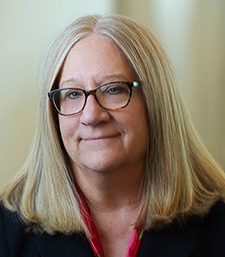While it might not hold a candle to the 40-city listening tour that NAMI Minnesota Executive Director Sue Abderholden took in 2017 to celebrate her organization’s 40th anniversary, this year’s statewide NAMI listening tour, back after a pandemic-forced hiatus, still aims to cover a lot of ground.
“I learned a lot from the tour I did pre-covid,” Abderholden said. “It was exhausting, but I found it really valuable.” With Covid now “more in the back of people’s minds,” Abderholden said, the nonprofit decided the time was right to go back on the road and meet with people in their communities to talk about its work supporting people with mental illness.
Though the number of meetings will be smaller this time around, Abderholden is confident that her organization’s message will be spread across the state. “This is much easier than the 40-city tour,” she said with a laugh. “But we’ll still be covering a lot of ground.”
The goal of a NAMI listening tour is to provide an opportunity for leadership of the powerful statewide nonprofit to share legislative successes and challenges with members, as well as to give attendees, many of whom have lived experience with mental illness, an opportunity to air their own concerns about unfair treatment or other challenges they face.
The listening sessions usually open with introductions — especially if the audience is small enough — and then transition into legislative updates. The open discussion part usually happens closer to the end, Abderholden said; it’s an invaluable opportunity to get a sense of community concerns. “We ask, ‘What are the barriers? What are the problems you see? What would you like to see different?’” she explained. “Then it becomes a broader conversation. We like to think we have our fingers on the pulse of what’s going on.”
 Sue Abderholden Credit: NAMI
Sue Abderholden Credit: NAMI
Advocates for people with mental illness made some significant gains at the Capitol this year, including providing $3 million in increased funding for school-linked mental health care and $1.75 million to engage people voluntarily in treatment before they are a danger to themselves or others, end up in the ER or have police involvement. There was also a successful push to require the Minnesota Department of Human Services to study the potential of providing Medicaid funding for mental health clubhouses and a new rule that renters can’t be evicted for calling 911 during a mental health crisis.
Abderholden said that one of the main goals of the listening tour is to “tell people about what actually gets done at the Legislature in terms of mental health. Largely this is not reported and we want to let people know what passed.” She said that many NAMI members don’t know about the gains that were made during the legislative session, and she and her colleagues believe it is just as important to spread positive news as it is to highlight concerns.
“We go through what passed this last session and the implications for people with mental illness and their families,” Abderholden said. “There were a lot of things that passed that people need to know about.”
Though Abderholden, who has been at NAMI’s helm for 22 years, was the main attraction during the 2017 tour, this year she will be joined by Elliot Butay and Sarah Knispel, NAMI Minnesota senior policy coordinator and public policy coordinator, respectively. So far, listening sessions have been held in St. Paul, Northfield and Mankato. Upcoming sessions are scheduled for Duluth, Grand Rapids, St. Cloud, Alexandria and possibly Winona. More will be scheduled in other communities.
Sharing progress
The first listening session, held at NAMI’s St. Paul office, was attended by about 10 people, all of whom had lived experience with mental illness. “They were a variety of ages,” Abderholden said. After introductions, Abderholden opened the meeting with a rundown of the legislative accomplishments that happened this session.
She feels that getting information out about progress toward equality for people with mental illness is an important way to engage and encourage members to keep up the fight.
“People don’t always know that change happens,” Abderholden said. “It is hard to hang on to hope, hard to keep doing good work, when you think nothing’s happening.” That’s why she likes to lead with a legislative update: “When you actually go through the progress that happened at the Capitol with people, they say, ‘Oh wow. That was a lot.’ I always say, ‘Change happens every day and you can be part of it.’ Too often people are disconnected from that and feel pretty hopeless about the situation.”
Hearing from individuals about issues that concern them is also important, Abderholden said. While member input gathered from the sessions may not always help her and her staff develop their legislative policy, it does, she said, “give us ideas so we understand what’s going on across the state.”
That’s why it is so important to travel and meet people in their home communities. “We know there are differences between rural, urban, suburban experiences for people with mental illness,” Abderholden said. “Meeting people where they live helps us get a better understanding of the issues that affect them.”
Some of the biggest issues that attendees have been raising during the listening sessions are, Abderholden said, “concerns about the quality of care people have been receiving in emergency rooms. There were other concerns about the quality of care in general, concerns about funding for the workforce, for housing, and early intervention. People were very excited about the fact that we got money for a volunteer engagement project that we’ve been pushing for for years.”
Attendees also raised concerns about signing up for Medicaid benefits after post-Covid government program shifts required many enrollees to re-enroll for programs. “People complained about losing their insurance,” Abderholden said. “It was hard to get re-enrolled. Some people were without their medication, which had a huge impact on them.”
Those concerns aside, Anderholden said the general tone of the listening sessions that have been held so far has been positive. Even in the face of challenges like economic downturns and political strife, progress is still being made to support the rights of people with mental illness, she said.
“Not every year is a great year,” Abderholden said. “Even in really bad economic times we’ve still seen some positive policy things take place.” When the mood in the room takes a downturn, and the conversation focuses on negative outcomes, Abderholden said she does her best to redirect attention to the reality of positive change .
“There is that old adage that goes, ‘Birds don’t fly into the wind,’” she said. “That’s us: Even in bad times, we are gathering our strength, organizing and preparing for the next session. I still believe in the process and I believe we can make change.”
Several NAMI listening sessions are still scheduled for Greater Minnesota in the late summer and early fall. For more information, go to:

Andy Steiner
Andy Steiner is a Twin Cities-based writer and editor. Before becoming a full-time freelancer, she worked as senior editor at Utne Reader and editor of the Minnesota Women’s Press. Email her at asteiner@minnpost.com.
Related
Source link : http://www.bing.com/news/apiclick.aspx?ref=FexRss&aid=&tid=66b0c73c019641438e8b41fc0d34bb7b&url=https%3A%2F%2Fwww.minnpost.com%2Fmental-health-addiction%2F2024%2F08%2Fnami-minnesotas-statewide-listening-sessions-focus-on-legislative-gains-member-concerns%2F&c=11719673700429743132&mkt=en-us
Author :
Publish date : 2024-08-05 00:10:00
Copyright for syndicated content belongs to the linked Source.